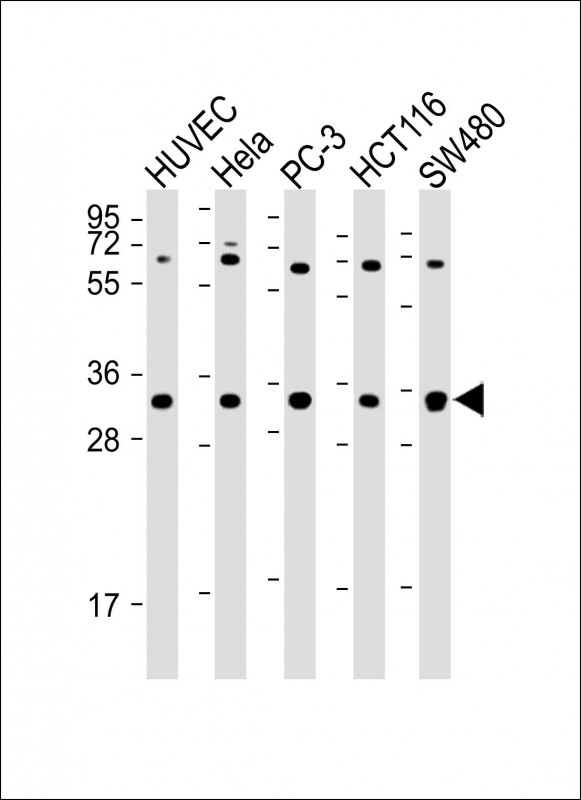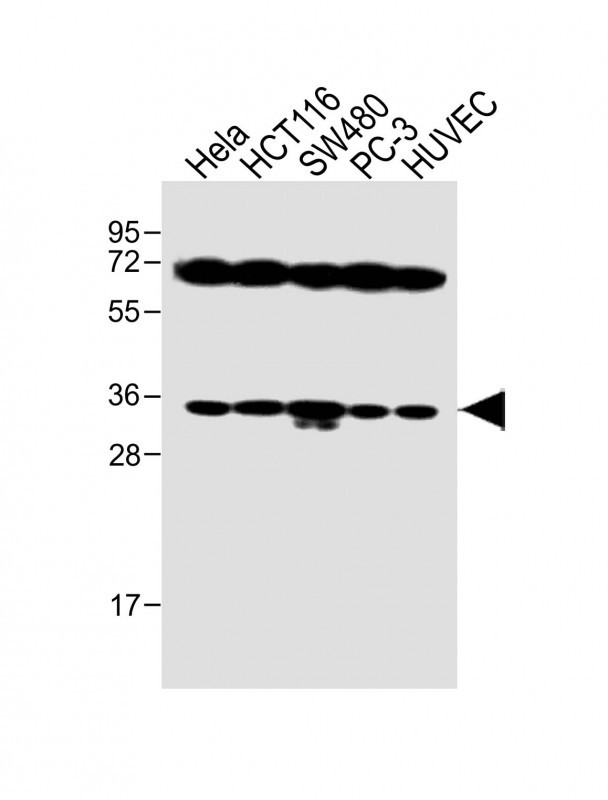

| WB | 咨询技术 | Human,Mouse,Rat |
| IF | 咨询技术 | Human,Mouse,Rat |
| IHC | 咨询技术 | Human,Mouse,Rat |
| ICC | 技术咨询 | Human,Mouse,Rat |
| FCM | 咨询技术 | Human,Mouse,Rat |
| Elisa | 咨询技术 | Human,Mouse,Rat |
| Aliases | Tumor necrosis factor receptor superfamily member 6B, Decoy receptor 3, DcR3, Decoy receptor for Fas ligand, M68, TNFRSF6B, DCR3, TR6 |
| Entrez GeneID | 8771 |
| WB Predicted band size | 32.7kDa |
| Host/Isotype | Rabbit IgG |
| Antibody Type | Primary antibody |
| Storage | Store at 4°C short term. Aliquot and store at -20°C long term. Avoid freeze/thaw cycles. |
| Species Reactivity | Human |
| Immunogen | This TNFRSF6B antibody is generated from rabbits immunized with a KLH conjugated synthetic peptide between 22-48 amino acids from the N-terminal region of human TNFRSF6B. |
| Formulation | Purified antibody in PBS with 0.05% sodium azide. |
+ +
以下是关于TNFRSF6B (N-term)抗体的3篇参考文献,按文献名称、作者和摘要内容概括整理:
---
1. **"DcR3/TR6 modulates immune cell interactions in tumor microenvironment and promotes cancer progression"**
- **作者**: Pitti, R.M. et al.
- **摘要**: 该研究利用TNFRSF6B(DcR3)的N端特异性抗体,揭示了其在肿瘤微环境中通过中和FasL和TL1A信号通路,抑制T细胞凋亡并促进免疫逃逸的作用。抗体验证表明其在组织样本中的高表达与癌症预后不良相关。
2. **"Characterization of decoy receptor 3 (DcR3) expression in colorectal carcinoma tissues"**
- **作者**: Zhan, H. et al.
- **摘要**: 通过N端抗体进行免疫组化分析,发现TNFRSF6B在结直肠癌组织中显著过表达,且与肿瘤侵袭性和血管生成标志物(如VEGF)呈正相关,提示其作为潜在治疗靶点的价值。
3. **"Functional analysis of DcR3 splice variants in autoimmune diseases"**
- **作者**: Kim, S. et al.
- **摘要**: 研究使用针对TNFRSF6B N端的多克隆抗体,证实了不同剪接变体在类风湿性关节炎患者血清中的存在,并发现其通过调节TL1A信号通路加剧炎症反应,为自身免疫疾病的机制提供了新见解。
---
以上文献均涉及TNFRSF6B N端抗体的实验应用,涵盖癌症、免疫调控等领域。如需具体期刊信息或年份,可进一步补充检索。
The TNFRSF6B (N-term) antibody targets the N-terminal region of TNF receptor superfamily member 6B (TNFRSF6B), also known as decoy receptor 3 (DcR3) or TR6. TNFRSF6B is a soluble protein belonging to the tumor necrosis factor receptor (TNFR) family, which lacks a transmembrane domain and functions as a decoy receptor. It binds to ligands such as Fas ligand (FasL), TNF-like ligand 1A (TL1A), and LIGHT, thereby inhibiting their interactions with pro-apoptotic or pro-inflammatory receptors (e.g., Fas, DR3. and LTβR). This immunomodulatory role makes TNFRSF6B critical in regulating immune responses, with implications in cancer, autoimmune diseases, and inflammatory disorders.
The N-terminal region of TNFRSF6B contains conserved cysteine-rich domains (CRDs) essential for ligand binding. Antibodies targeting this region are often used to study the protein's expression, localization, and function in both physiological and pathological contexts. Researchers employ TNFRSF6B (N-term) antibodies in techniques like Western blotting, immunohistochemistry, and ELISA to detect endogenous or recombinant TNFRSF6B, assess its overexpression in tumors, or investigate its role in evading immune surveillance. These antibodies may also aid in exploring therapeutic strategies, such as blocking TNFRSF6B to restore apoptosis in cancer cells or modulate autoimmune pathways. Validation of antibody specificity typically involves knockout controls or peptide blocking assays to ensure accurate detection.
×